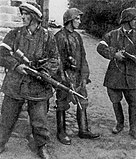Leśni
| Part of a series on the |
Underground State |
|---|
 |
|
Authorities |
|
Political organizations |
|
Military organizations |
|
Related topics |
Leśni ludzie (Polish: [ˈlɛɕɲi ˈludʑɛ], "forest people") is an informal name applied to some anti-German partisan groups that operated in occupied Poland during World War II, being a part of Polish resistance movement.
The "forest people" groups comprised mostly people who for various reasons could not operate from the communities they lived in and had to retreat into the forests.
Unlike most organized resistance groups, such as the Home Army, the "forest people" formed a sort of standing army, as opposed to regular partisan units that gathered shortly before an operation and afterward returned to their homes.
After the 1939 fall of Poland[edit]

The first such groups formed in 1939, shortly after the invasion of Poland. Membership comprised mostly marauders from the Polish Army and other people who evaded arrest by the new Nazi or Soviet authorities. In March 1940 the partisan unit of the first guerrilla commander in the Second World War in Europe—Henryk Dobrzański "Hubal"—completely destroyed a battalion of German infantry in a skirmish near the village of Huciska. A few days later in an ambush near the village of Szałasy it inflicted heavy casualties upon another German unit. To counter this threat the German authorities formed a special 1,000-strong anti-partisan unit of combined SS and Wehrmacht forces, including a Panzer group. Although Major Dobrzański's unit never exceeded 300 men, the Germans fielded at least 8,000 men in the area to secure it.[1][2]
Under German occupation 1939–1945[edit]
Although most of the groups accepted the overall command of ZWZ and then of the Home Army, different realities made them remain largely independent.
In early 1943 the strength of the leśni groups can be estimated at about 40 groups numbering in total 1,200 to 4,000 fighters, but the numbers grew significantly during Operation Tempest in 1944.[3]
Uprisings, operations and battles[edit]
- Czortków Uprising
- Zamość Uprising
- Operation Wieniec
- Operation Arsenal
- Warsaw Ghetto Rising
- Operation Belt
- Operation Heads
- Operation Bürkl
- Operation Most III
- Operation Kutschera
- Battle of Murowana Oszmianka
- Battle of Porytowe Wzgórze
- Battle of Osuchy
- Operation Tempest
- Operation Ostra Brama
- Lwów Uprising
- Warsaw Uprising
- Attack on the NKVD Camp in Rembertów
- Battle of Kuryłówka
- Augustów chase 1945
Notes[edit]
- ↑ Marek Szymanski: Oddzial majora Hubala, Warszawa 1999, ISBN 83-912237-0-1 Search this book on
 .
.
- ↑ Aleksandra Ziolkowska-Boehm: Polish Hero Roman Rodziewicz Fate of a Hubal Soldier in Auschwitz, Buchenwald and Postwar England, Lexington Books, 2013, ISBN 978-0-7391-8535-3 Search this book on
 .
.
- ↑
Roy Francis Leslie, The History of Poland Since 1863, Cambridge University Press, 1983, ISBN 0-521-27501-6 Search this book on
 ., Google Print, p.234-235
., Google Print, p.234-235
See also[edit]
This article "Leśni" is from Wikipedia. The list of its authors can be seen in its historical and/or the page Edithistory:Leśni. Articles copied from Draft Namespace on Wikipedia could be seen on the Draft Namespace of Wikipedia and not main one.
